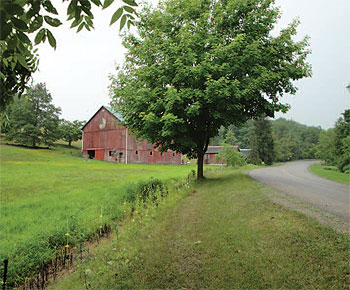Federal Farm Bill Up for Renewal in 2012

Farm and Ranchland Protection Program funds were used to keep the Kinsey family farm in Westmoreland County in production.
Courtesy of WCALP
Conservation programs included in the federal Food, Conservation, and Energy Act or “farm bill” provide funding that allows the Western Pennsylvania Conservancy to help protect farms and forestlands. Because of this direct connection to our work, the Conservancy has been encouraging Pennsylvania’s Congressional delegation to ensure that the bill’s five-year reauthorization in 2012 includes strong conservation and forestry components, despite a very tight fiscal situation.
During the bill’s review and reauthorization roughly every five years, Congress determines spending levels for programs including rural development, conservation and forestry.
The last farm bill, passed in 2008, authorized more than $280 billion in funding, $24 billion of which was allocated for conservation efforts. This represents one of the government’s largest investments in protecting and conserving vulnerable land and water.
Various programs funded by the farm bill are important to WPC conservation efforts. As of this writing, it is expected that some of these programs will be consolidated or reconfigured to reduce costs. Programs important to the Conservancy include:
Farm and Ranchland Protection Program (FRPP)
FRPP provides matching funds to help purchase development rights in order to keep productive farms and ranchland in agricultural uses. These funds have allowed WPC to help complete a variety of farm preservation projects. For example, WPC used FRPP support in 2009 to help brothers Ray, Jack and Larry Kinsey protect their maple sugaring operations. The 179-acre farm is located in Westmoreland County and has been in the Kinsey family since the early 1800s.
Conservation Reserve Enhancement Program (CREP)
CREP provides financial incentives for farmers to take marginal land out of production to support conservation objectives. WPC’s Watershed Conservation Program promotes the program and works with eligible farmers to apply for funding. Watershed Scientist Alysha Trexler manages WPC’s CREP outreach. To date, she and fellow staff members have reached out to more than 6,500 farmers in over 16 Western Pennsylvania counties about the program.
Environment Quality Incentives Program (EQIP)
EQIP provides cost-sharing assistance to help farmers and forestland owners employ practices that are smarter for the environment, such as manure management and stream bank fencing. Only individuals or entities engaged in livestock or agricultural production, which includes forestry, may participate in EQIP.
